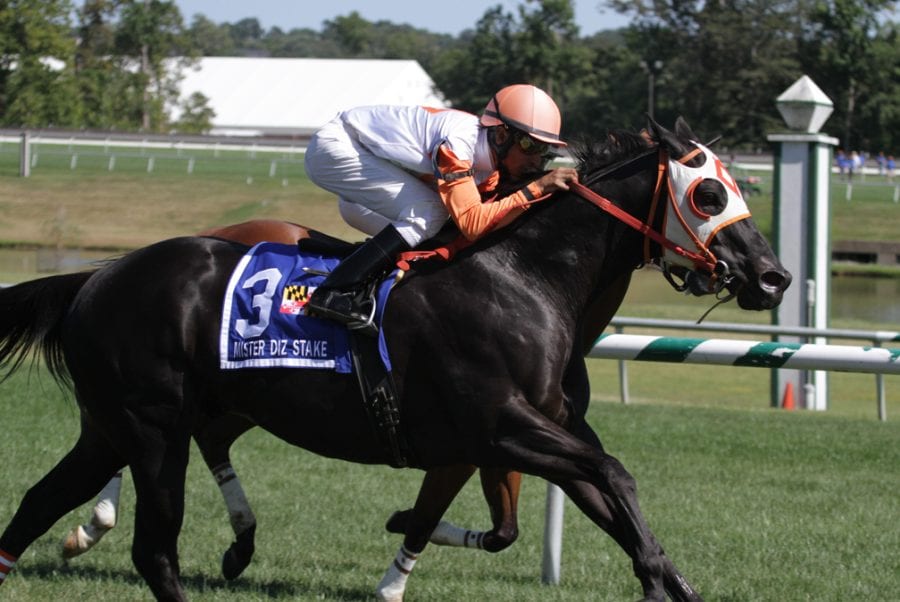
Ben’s Cat won his sixth consecutive Mister Diz Stakes in 2015. Photo by Laurie Asseo.
by Frank Vespe
The Twitter calls started just about as soon as Ben’s Cat crossed the finish line, in seventh, in the Fabulous Strike at Penn National last month.
“Time to retire the old warrior,” one racing fan tweeted.
“Might be time,” said another.
“Time to hit the retirement home,” said a third.
It looks like Ben’s Cat doesn’t want to play ball anymore. Time to retire the old warrior and not tarnish his career.
— Bob Ike (@bobike1) November 26, 2015
If anything, those calls intensified on the news that trainer — and owner, and breeder — King Leatherbury plans to bring the now-nine-year-old back for another season in 2016.
“A recipe for disaster,” said a racing fan on Facebook.
“Leatherbury is squeezing the lemon as dry as he can,” said another.
It’s hard to blame them. A horse like Ben’s Cat — a Maryland-bred who has won 30 races, earned more than $2 million, and raced productively for six seasons — builds a fan base, and it’s natural for those fans to worry.
What’s more, this hasn’t been anything like Ben’s best seasons. Though he’s won twice and earned over $170,000 this season — meaning he’s been in the top one percent of American Thoroughbreds in terms of earnings this year — it’s been the worst season of a career in which he’s never previously won fewer than four races or earned less than $200,000 in a season.
Add to all that his advancing age — only one horse nine or older has earned as much as Ben’s Cat this year — and you can see why people are calling for retirement.
I’m not one of them, however.
Don’t get me wrong: if King Leatherbury decided to retire Ben’s Cat tomorrow (which he’s not going to do), that would be fine by me. Neither the horse, nor the trainer, owes me or other racing fans anything more than the joy they’ve already brought.
But if Leatherbury, who’s already said we wouldn’t see the horse in claiming races, believes he can get Ben to continue to run at a high level? Well, if any trainer-horse combo has ever earned the benefit of the doubt, it’s King Leatherbury and Ben’s Cat.
Leave aside, for the moment, that Leatherbury is a member of the national Racing Hall of Fame who has won more than 6,400 races in his remarkable career. Ignore for the time being that Leatherbury probably forgets more about racing each day than most of us will ever know.
Concentrate, instead, on the job that he’s done with Ben’s Cat.
Here’s a horse whose breeding didn’t set many hearts aflutter; his sire, Parker’s Storm Cat, a half-brother to Malibu Moon, washed out after a time in Maryland and now stands at, yes, Gibson Thoroughbred Farm in Washington state.
Here’s a gelding who didn’t debut at two. Or, after suffering a broken pelvis, at three. But Leatherbury stuck with him, finally getting him to the races in May of his four-year-old season.
And since?
Ben’s Cat became, you know, Ben’s Cat, during a five-year-old campaign, 2011, in which he earned nearly $600,000, won six races, and flirted with a trip to the Breeders’ Cup Turf Sprint, a berth which he’d secured by rallying late to win the Grade 3 Turf Monster at Parx Racing. (Leatherbury ultimately demurred because the fee to supplement would have been too high.)
From 2011 onward, his campaigns have been nearly identical: eight or nine races a season, a regular schedule of racing beginning each April and concluding at the end of November. In each of those five seasons, following the Fabulous Strike (and before that the Six Bits) on Thanksgiving eve at Penn National, Leatherbury has sent his star pupil to the farm for a few months of r’ ‘n’ r’.
It’s been a remarkably consistent schedule, and the result has been a remarkably sound, consistent horse. Each year prior to this one, Ben’s Cat has won at least four times and earned at least $200,000 — and had he had the luck of the bob in his two nose defeats this year, in the Pennsylvania Governor’s Cup and the Maryland Million Sprint, he’d have kept both streaks alive.
His speed figures tell the same tale. In fact, his top Equibase speed figure of 2015, a 110, is one point higher than the best he achieved at age four, way back in 2010.
In fact, when you get down to it, Leatherbury’s handling of Ben’s Cat has been a virtuouso performance, a demonstration of how to keep a horse sound, happy, and speedy year after year. It’s used old-school wisdom — run the horse when he’s ready, give him a break between seasons — while continually putting the horse in spots he can succeed.
Of course, everybody wants the same outcome for Ben’s Cat: a happy ending, a long retirement, and some of those horse cookies he occasionally gets.
And it may be that his efforts early next season will tell us that the time has, indeed, arrived for that.
But if King Leatherbury — that is, Hall of Famer King Leatherbury, with the mountain of wins, the man whose judicious tutelage of Ben’s Cat at every step has been beyond reproach — if that guy thinks this horse can still get the job done, I’m willing to acknowledge that he knows far, far more than I do.
Yes, I’ll be rooting for a safe race for the old guy each time. But I’ll also be rooting for him to make at least one more trip to the winner’s circle, and I’ll wager I won’t be the only one.
Perhaps in the first running of the $75,000 Ben’s Cat Stakes, on March 19 at Laurel Park.








Had this exact conversation with one of my partners this week. If retired, what’s the horse going to do, stand around in a paddock all day? He’s a gelded working horse, he wants something to do, and that something is generally running around a track. Leatherbury isn’t going to abuse the best horse he’s ever had. Good for them both.